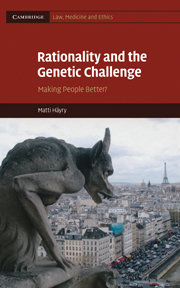Book contents
- Frontmatter
- Contents
- Preface
- 1 Seven ways of making people better
- 2 Rational approaches to the genetic challenge
- 3 The best babies and parental responsibility
- 4 Deaf embryos, morality, and the law
- 5 Saviour siblings and treating people as a means
- 6 Reproductive cloning and designing human beings
- 7 Embryonic stem cells, vulnerability, and sanctity
- 8 Gene therapies, hopes, and fears
- 9 Considerable life extension and the meaning of life
- 10 Taking the genetic challenge rationally
- Bibliography
- Index
4 - Deaf embryos, morality, and the law
Published online by Cambridge University Press: 05 July 2014
- Frontmatter
- Contents
- Preface
- 1 Seven ways of making people better
- 2 Rational approaches to the genetic challenge
- 3 The best babies and parental responsibility
- 4 Deaf embryos, morality, and the law
- 5 Saviour siblings and treating people as a means
- 6 Reproductive cloning and designing human beings
- 7 Embryonic stem cells, vulnerability, and sanctity
- 8 Gene therapies, hopes, and fears
- 9 Considerable life extension and the meaning of life
- 10 Taking the genetic challenge rationally
- Bibliography
- Index
Summary
In this chapter, I explore arguments for and against selecting offspring who would probably be deaf. I suggest that reasonable parties could agree to disagree morally on the issue to achieve the nonrestrictive legal solution they prefer, before noting that conflicting rationalities can present obstacles to this.
Deafness as a test case
In the general discussion on prenatal selection in Chapter 3, it became clear that many ethical theorists draw a line between moral and legal norms. Moral duties cannot be automatically translated into legal obligations; and legal permissions do not always imply moral acceptance. This is clearly visible in the case of ‘deaf embryos’ – in the attempt of parents to create children who would be deaf like them.
This chapter studies the ethics of selecting ‘deaf embryos’ and argues that the deep moral disagreement visible in contemporary bioethical debate on the possibility of choosing deafness should probably be recognised and accepted, not drowned in feuds. I will first describe, in Sections 4.2 and 4.3, the background of the practice in emerging reproductive technologies and sketch the main moral and legal stands in its assessment and regulation. I will then go on to examine, in Sections 4.4 and 4.5, the moral justifications that have been given to the two competing views on the issue: the ‘medical view’ and the ‘social view’. The first of these states that selecting ‘deaf embryos’ is morally dubious although it should, as far as the law is concerned, be left to the discretion of the parents. The second contends that the practice is morally unproblematic or even commendable but agrees that the law should not interfere with parental choice.
- Type
- Chapter
- Information
- Rationality and the Genetic ChallengeMaking People Better?, pp. 78 - 98Publisher: Cambridge University PressPrint publication year: 2010
- 1
- Cited by



